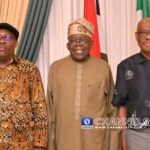The Fragile Peace Between Wike, Fubara, and Tinubu

Wike and Fubara: A Fractured Godfather-Godson Dynamic
Siminalayi Fubara, the current governor of Rivers State, ascended to power largely under the political umbrella of Nyesom Wike, his predecessor and a formidable political figure in the state and the ruling All Progressives Congress (APC). What began as a seamless transition of leadership has gradually evolved into a cold war.
Wike, now the Minister of the Federal Capital Territory (FCT), appears reluctant to fully release his grip on Rivers politics. Fubara, on the other hand, has begun asserting his independence, triggering a silent political rebellion. Disagreements over state appointments, fiscal decisions, and political control have exposed cracks in what was once viewed as a united front.
The governor’s recent moves—restructuring the state cabinet, asserting control over the State Assembly, and challenging entrenched interests—have been interpreted by Wike’s loyalists as acts of betrayal. Meanwhile, Fubara’s supporters view these steps as necessary for the governor to escape his predecessor’s shadow and truly lead.
Tinubu’s Balancing Act
President Bola Tinubu, known for his political acumen and strategic interventions, has found himself cast as the mediator. With Wike holding a federal portfolio and Fubara representing a vital oil-producing state, Tinubu is wary of any crisis that could destabilize the party or, worse, the region.
His attempts to douse the tension have included closed-door meetings, appeasements, and subtle warnings. However, the President is walking a tightrope. Any perceived favoritism could alienate one camp and fracture the already delicate unity within the APC.
Moreover, Tinubu’s broader challenge is to maintain peace without emboldening rebellion within the ranks. If Fubara is seen as defying a political godfather and succeeding, other protégés across the country might adopt a similar approach, weakening the hold of established power brokers like Wike.
Why This Peace is Fragile
The peace holding Rivers State and its key actors together is one stitched together by political expediency, not mutual trust. Neither Wike nor Fubara has made significant concessions, and both continue to maneuver behind the scenes. For now, public altercations have subsided, but the underlying friction is unresolved.
What makes this situation more precarious is the volatility of Nigerian politics. Alliances shift quickly. The 2027 elections may seem distant, but positioning for influence has already begun. Both Wike and Fubara likely see the present as a strategic prelude to the future, and neither is ready to fold.
Conclusion: A Ticking Clock
As of now, Tinubu’s intervention has created a temporary pause in hostilities, not a resolution. For sustainable peace, there must be a recalibration of power and mutual respect between the governor and his predecessor. Tinubu, for his part, must play the honest broker without undermining his own authority.
In the end, the peace among Wike, Fubara, and Tinubu is fragile—not because they lack the capacity for diplomacy, but because their interests are fundamentally misaligned. Until that changes, this truce will remain uneasy at best—and expl
osive at worst.
TRENDING SONGS
 NPMA Appeals to Nigerian Government for Compensation After Lagos Market Fire
NPMA Appeals to Nigerian Government for Compensation After Lagos Market Fire
 Rest Every Four Hours, FRSC Issues Safety Guide for Fasting Motorists
Rest Every Four Hours, FRSC Issues Safety Guide for Fasting Motorists
 NNPC Boss Ojulari Bags UK Energy Institute Fellowship
NNPC Boss Ojulari Bags UK Energy Institute Fellowship
 Shock in Anambra: Bride Disappears Moments Before Wedding
Shock in Anambra: Bride Disappears Moments Before Wedding
 Nigerian Woman Returns ₦330 Million Accidentally Credited to Her Account
Nigerian Woman Returns ₦330 Million Accidentally Credited to Her Account
 APC Don Reach Morocco?’ VeryDarkMan Reacts to Seyi Tinubu Poster
APC Don Reach Morocco?’ VeryDarkMan Reacts to Seyi Tinubu Poster
 Bride Breaks Down in Tears as Wedding Meals Were Kept Secretly While Guests Go Home Hungry
Bride Breaks Down in Tears as Wedding Meals Were Kept Secretly While Guests Go Home Hungry
 Odogwu by Day, Robber by Night: How Marriage Joy Turned Into Tragedy
Odogwu by Day, Robber by Night: How Marriage Joy Turned Into Tragedy
 Nigerian Officials Allegedly Pocket N4–6B Weekly Through Smuggling Cartels at Seme–Badagry Border
Nigerian Officials Allegedly Pocket N4–6B Weekly Through Smuggling Cartels at Seme–Badagry Border
 Ahmad Yerima: Naval Officer to Face No Sanctions After Clash with Wike – Matawalle
Ahmad Yerima: Naval Officer to Face No Sanctions After Clash with Wike – Matawalle
Share this post with your friends on ![]()













